HOME >> OP-ED
Plastic surgery slips could carve image up
By Park Gayoung Source:Global Times Published: 2015-1-27 20:23:01

Illustration: Liu Rui/GT
My first experience of plastic surgery goes back to my high school years. After one winter vacation, my classmate had turned up with a double eye-lid, which a few years later still looked fresh made. Another friend, this time at college, also went into a surgery and came out with a set of sausage-like eyes. The scars of failed surgeries lasted long and became the talk of the town for a while.Of course, what was happening was that people who successfully got their new eye-lids and noses would remain silent while unlucky ones would not be able to hide from it. Those experiences of my friends played a big role carving my perspective on plastic surgery.
That was why I believed plastic surgery would never get so popular. But the popularity of surgical methods for makeover have not only gone beyond my imagination but also crossed borders.
Now the technology in plastic surgery has so advanced that cutting off one's jaw has become almost common. South Korea's popular Gangnam area, which became famous due to Psy's hit song "Gangnam Style" and also a South Korea's cluster of plastic surgery clinics, has never seen that so many foreign patients.
At the heart of the plastic surgery expedition boom are Chinese patients. Around Gangnam area, many Chinese tourists can be seen with their faces wrapped in bloodstained cottons and bandages.
According to South Korea's Health and Welfare Ministry, among 24,075 foreigners visited South Korea for plastic surgery in 2013, and 68 percent or 16,282 of them were Chinese. This number is 20 times bigger than 2009 when just 791 Chinese people who came for aesthetic surgeries.
So it goes without saying that many plastic surgery clinics see Chinese customers as a new source of growth.
The ministry estimates Chinese tourists spent some 50 billion won ($46.3 million) for plastic surgeries in South Korea in 2013. But if the calculation was done in China, the number would be so much higher thanks to the biggest beneficiary of this growing demand for plastic surgery by Chinese people - brokers.
According to the Chairman of the Korean Association of Plastic Surgeon (KAPS), Dr. Cha Sang-myun, brokers often rip off Chinese patients, sometime charging 10 times what it actually costs and take 90 percent of what a Chinese patient pays. The government's guideline for intermediaries, 15 percent, seems existing only in a policy guideline.
Chinese patients, often due to the language barriers and asymmetry of information, just rely on their broker, but the interests of patients are not their priority.
In a negotiation between brokers and clinics, brokers, with Chinese customers as their bait, have bargaining power. They select whichever hospital pays the highest commission fees rather than try to find the best hospital for patients. This can leave Chinese patients on the hands of a hospital with less experienced surgeons, leaving them vulnerable to scams or botched surgery.
Some brokers are not reluctant to lie to patients about surgical needs. Some tell Chinese patients that their noses are quite unique and require special procedures.
In addition, as Chinese patients tend to get multiple surgeries at one visit, brokers and doctors often suggest unnecessary surgeries, which many of Chinese patients accept.
Against this backdrop, Cha of the KAPS suggested adopting a VAT tax refund scheme in which foreigners can get tax refund for their operations as they leave the country. The idea is that in order to get a 10 percent tax refund, people who underwent plastic surgery would ask receipts from hospitals, leaving less room for brokers to cheat either hospitals or patients.
This is only one of many things that can be done to avoid more victims. It is important not only because the consequence of a big rip-off or a screwed surgery is huge for individuals but also because it can do collateral damage to the image of South Korea, much bigger damage than the experience of a bad service or a padded bill.
Just as the failed surgeries of my friends turned me away from plastic surgery for good, it could turn away many Chinese tourists or patients from what is one of the most desired destinations for tourism and plastic surgery.
The medical technology gap between South Korea and China is getting narrower, as Cha pointed out, and if South Korean clinics are to remain attractive for people wanting a plastic surgery, they must be transparent and honest.
The author is a reporter with the Global Times. gayoungpark@globaltimes.com.cn
Posted in: Viewpoint